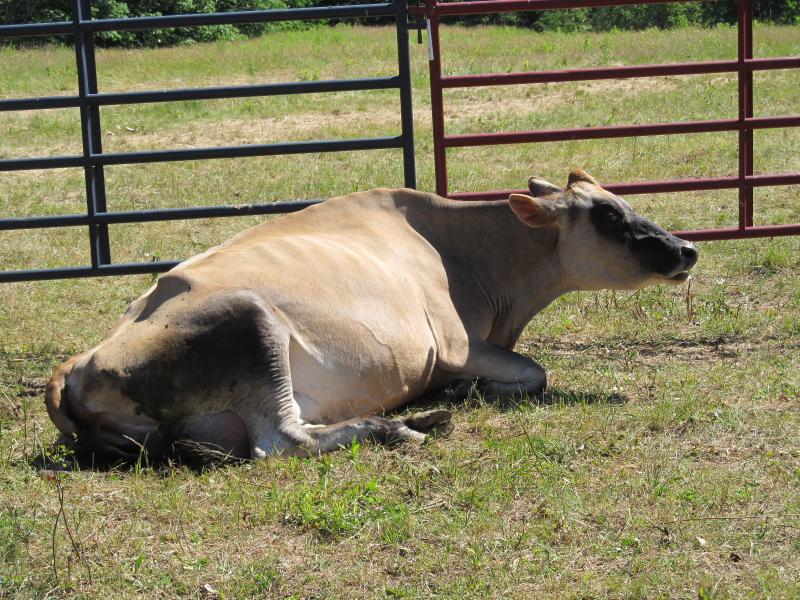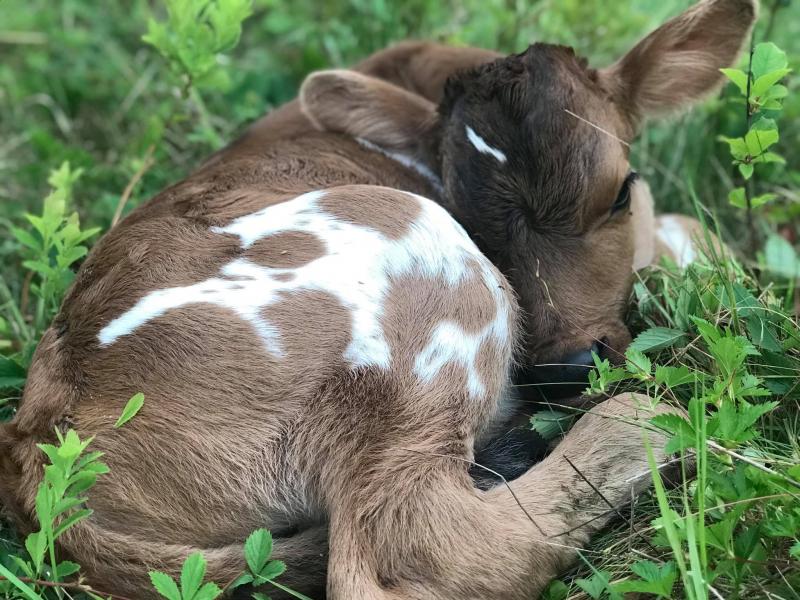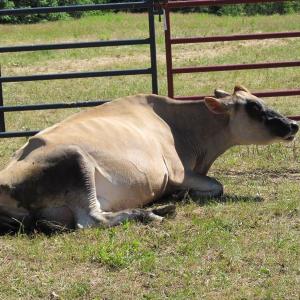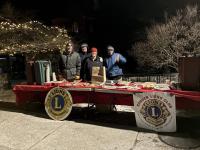Peace Ridge Animal Sanctuary rescues entire malnourished dairy herd
BROOKS— Peace Ridge Animal Sanctuary is the superhero of farm animal rescue in the Midcoast, rescuing more than 1,110 abused, exploited and severely neglected farm animals with the only purpose to give them safety and sanctuary for the rest of their lives.
However, even they weren’t fully equipped to handle a call they got in late June from the state Animal Welfare Program, which is responsible for investigating animal cruelty cases.
“They told us they had an ongoing situation with a herd of 15 cows, calves and one bull they’d been trying to remedy with a farmer, who failed to comply,” said Peace Ridge’s founder and director Daniella Tessier. “The way I understand it the compliance orders were completely basic: just provide the herd with food and water and they didn’t get that.”
The case is still under an open investigation according to Liam Hughes, the Maine Director of Animal Welfare for the Department of Agriculture and Forestry.
“This case is not something we normally deal with because the person was not an organized dairy farmer,” he said. “This was more along the lines of someone wanting to become a hobby farmer, but no milk had been sold at that point.”
The mixed herd, consisting of Holstein, Guernsey and Jersey breeds were emaciated and needed immediate care, but there was no place to bring them when the Animal Welfare Program asked Peace Ridge if they could help.
Tessier had to seriously weigh the enormous responsibility of taking in an entire dairy, sitting on the request for several days and conferring with her board and staff.
“The general public perception is that if you have a fenced in pasture, just stick them in there, give them some food and water and they will be okay,” she said.
The truth is that to take that many cows in, each would have to be tested for contagious bovine diseases, given a thorough medical intake examination by a veterinarian, treat the numerous issues that the cows had such as mastitis, which is an infection, of the udders and of course—food and water.
“We were looking at $6,000 in veterinary care for the tests, vaccinations and treatment,” she said. “And it would require ordering 14,000 hay bales. It would be a huge financial risk, in that if we spent the money we didn’t have and the cows were all diagnosed with contagious bovine disease, we couldn’t keep them. But, on the other hand, if they were cleared, cows can live to be 25 years old and this would be a monumental undertaking to prepare to keep them alive that long.”
But, ultimately Tessier, the board and staff all agreed they’d do whatever it took to pull together some fundraisers and work harder to keep the dairy.
Once they took the cows in, and the tests started coming back, they knew what they were in for.
“They all had upper respiratory infections we had to treat,” said Tessier. “We had two pregnant cows with calves that weren’t getting nourishment because most of the cows had chronic, painful mastitis. It was so bad, we had to take one of the mother cows to the vet to have part of her udder surgically removed. Every time I tried to touch her, to get that milk flowing, her udder was hot to the touch, it was bleeding and nasty, and she’d try to give me a little side kick. The calf is also being treated at the animal hospital for a septic joint in her hoof. It looks like it got stepped on at one point and became severely infected. They’re really gentle animals, but they were hurting.”
How you can help
Peace Ridge needs 7,000 more bales of hay that needs to be paid for by the end of August. You can donate to the website directly.
You can also follow their future fundraising events for the cows.
Or you can organize your own “cocktail/cowtail” fundraising party in your living room or back deck and donate the proceeds to Peace .
Most of the time in the dairy industry, according to Tessier, when cows develop chronic mastitis, they are not treated; they are simply culled and sent to the slaughterhouse.
After several weeks, the cows and calves have gained weight and are beginning to trust Peace Ridge’s staff, who care for them every day. The bull is kept separate, and his story is another situation which grieves Tessier.
“He is the son of the oldest matriarch here in the herd and was made to be the breeding bull — I’m pretty sure, not only with his own mother, but with all of his siblings, which is completely ridiculous because the calves would end up with so many abnormalities.”
Since Peace Ridge first broke the news on their Facebook page, loyal following of the sanctuary as well as the community has stepped up to donate nearly $9,000. “That’s great and pays for a number of bales we’ve ordered so far. But, we still need donations to help these animals with their particular situation.”
For more information, or to donate visit Peace Ridge Animal Sanctuary’s website.
Related: Rescued farm animals get a better life at Peace Ridge Sanctuary
Kay Stephens can be reached at news@penbaypilot.com
Event Date
Address
United States
































